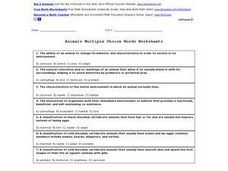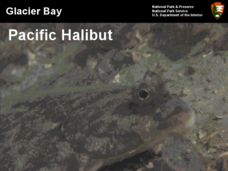K12 Reader
Hide and Seek
Why do certain animals look the way they do? It could be because they have developed camouflage. Kids can read up on camouflage and mimicry and then respond to five questions related to the content of the passage.
Curated OER
Why are Polar Bears White
Students explore camouflage as they study polar bears and their habitat. They study how color can help animals in the wild.
Curated OER
Finding Caterpillars
Students examine how animals protect themselves from predators and camouflage themselves. They participate in a simulation in which they locate red and green yarn "caterpillars," organize their data, and generate a bar graph using...
Curated OER
Feeding Frenzy
Young biologists take a look at the myriad of ways that animals increase their chances of surviving in the wild. The adaptations help animals hide, hunt, and attract a mate. This lesson specifically explores how insect mouth parts are...
Curated OER
Blending Butterflies
Students create camouflage butterflies. In this camouflage lesson plan, students read about the different types of camouflage. Each student in the class chooses a spot in the classroom and creates a camouflaged butterfly. They hang up...
Curated OER
Hide In Plain Sight
Students view video clips and use the Internet to look for hidden animals. They then use the Internet to print out animal shapes and color them. They create environments on construction paper in which their animals can hide.
Curated OER
The Big Hideout
Middle schoolers identify the types of camouflage used by animals in the desert. They work together to create their own animal creating their own type of camouflage. They determine how well the camouflage works.
Curated OER
Animals
Students investigate classifying animals. In this animal classification lesson, students choose three animals that use camouflage and list three facts about that animal. Students create a story about the animal, present it to the...
Curated OER
The Amazing Octopus
Learners design imaginary animals that are able to blend into their backgrounds. In this biology lesson plan, students will learn the importance of camouflage in protecting animals from predators. Learners will select a peer to act as...
Curated OER
Birds & Caterpillars
In this biology worksheet, students explain the use of camouflage as a defense mechanism. Then they list examples of insects that use camouflage to protect them from predators. Students also identify and name other types of defense...
Curated OER
Awesome Adaptations!
Second graders explore biology by researching animal characteristics. In this adaptation lesson, 2nd graders identify the history of several animals and research the changes that have occurred to their anatomy over thousands of years....
Curated OER
Whose Skin
In this animal skin types worksheet, students complete a chart using names of animals, description of animal's skin, where it can be found and illustrating a picture of the animal's skin.
Curated OER
TIDES
Second graders are taught the concept of camouflage through the game hide and seek. They view photographs of camouflaged animals on the TIDES website. Students create a poster that camouflages a particular animal based on what they have...
Curated OER
Animals Multiple Choice Words Worksheet
Looking for some simple multiple-choice questions for an upcoming biology unit on animals? This worksheet features 7 clearly worded questions, each with 4 possible answers. Topics include adaptation, camouflage, ecosystems, animal...
K5 Learning
Survival in the Wild
How do animals survive in the wild? Read about the different adaptations such as camouflage and self-protection that animals use to survive.
Virginia Department of Education
Adaptation and Evolution
Um may be the atomic symbol for confusion, but it won't be needed in this instructional activity. Scholars rotate through seven stations completing experiments, hands-on activities, writing exercises, and analysis. Stations include...
Curated OER
How Organisms Live Successfully in Their Environments
Students compare the climate and organisms found in different environments, then give examples of how plants and animals adapt to their environment. They design an animal who adapts using camouflage to a made-up environment.
Curated OER
Create a New Animal
Students understand what physical adaptations are and how they help an animal to survive. For this adaptations lesson, students research four animals and then make an original animal that has adaptations to make them survive.
Curated OER
Caterpillar Camouflage
Young scholars list animals, plant parts, and reasons for caterpillars to camouflage themselves. For this animal and plant adaptations lesson plan, students also play a game where they use colors as camouflage.
Curated OER
Disguise for the Eyes
Young scientists discover how many, many animals use color as a way of helping them to survive in the wild. They understand how animals use color in their everyday lives. Pupils engage in hands-on activities, watch videos, access...
Purdue University
Coloration Exploration
Finding an animal in nature can be like a game of hide and seek. A thorough lesson explores different coloration strategies of animals. Pupils complete look-and-find puzzles and coloring sheets to differentiate between different types of...
Curated OER
Glacier Bay Pacific Halibut
The National Park Service has produced a high-quality presentation on the halibut population of Glacier Bay, Alaska. It takes the viewpoint of the marine biologists or rather, ichthyologists, who have been studying the adaptations,...
Curated OER
Week 7: Animal Adaptations - Bird Beaks
Learners use tools to represent bird beaks and pick up different types of food with them in order to discover which beak would help the bird survive depending on their food type.
Curated OER
Hide and Seek
Pupils examine animals that use camouflage and discuss why they use it. They create drawing of an imaginary animal that uses camouflage to hide in the classroom and identify the adaptations that would allow it to hide effectively.
Other popular searches
- Powerpoint Animal Camouflage
- Animal Camouflage Adaptation
- Animal Camouflage Omnivore
- Animal Camouflage Lessons
- Camouflage Mimicry Animal

























